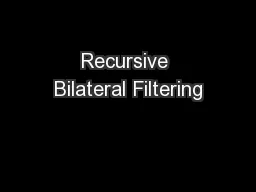PPT-Filtering and Edge Detection
Author : test | Published Date : 2018-09-26
Szymon Rusinkiewicz Convolution how to derive discrete 2D convolution 1dimensional 2dimensional Discrete Where fij is any given image gij is a mask hij is an
Presentation Embed Code
Download Presentation
Download Presentation The PPT/PDF document "Filtering and Edge Detection" is the property of its rightful owner. Permission is granted to download and print the materials on this website for personal, non-commercial use only, and to display it on your personal computer provided you do not modify the materials and that you retain all copyright notices contained in the materials. By downloading content from our website, you accept the terms of this agreement.
Filtering and Edge Detection: Transcript
Download Rules Of Document
"Filtering and Edge Detection"The content belongs to its owner. You may download and print it for personal use, without modification, and keep all copyright notices. By downloading, you agree to these terms.
Related Documents













